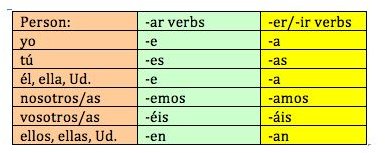
Te prestaré mi bici siempre y cuando la cuides. I lent you my bike provided that you would take care of it. Te presté mi bici con tal de que la cuidaras. I’ll lend you my bike on condition that you take care of it. Te presto mi bici a condición de que la cuides. I’m really glad I’m going to the cinema with you. Me alegro muchísimo de ir al cine contigo. I’m really glad that you’re coming to the cinema with me. Examples: Me alegro muchísimo de que vengas al cine conmigo. If the verb in the main clause takes a preposition, this comes before the conjunction or before the infinitive. subject 1 (yo) = subject 2 (yo) → infinitive If both verbs in the sentence share the same subject, the verb in the subordinate clause is expressed in the infinitive, not the subjunctive. subject 1 (yo) + que + subject 2 (tú) → subjunctive I want you to come to the cinema with me. Example: Quiero que vengas al cine conmigo. They are connected by a conjunction (often que). In compound sentences with two different subjects, the verb in the main clause is in the indicative while the verb in the subordinate clause is in the subjunctive. → advice main clause with verb of influence (recomendar) + que + subordinate clause in the subjunctive (veamos)Īnother feature of subjunctive sentences is that there is usually a change of subject (el cambio de sujeto) between the main clause and the subordinate clause. The teacher advised us to watch Spanish films. We also use the subjunctive after verbs of influence (verbos de influencia) like aconsejar, desear, mandar, necesitar, obligar, ordenar, suplicar, recomendar, querer, prohibir, etc.Įxample: El profesor nos ha recomendado que veamos películas en español.

I’m happy that we learn cultural facts in Spanish class. → obligation Me alegra que aprendamos curiosidades culturales en la clase de español. → desire Es necesario que repase la lección en casa. I would love it if everyone spoke several languages. → possibility Me encantaría que todo el mundo hablara varios idiomas. → doubt Puede que necesite practicar en casa. I doubt that I can learn everything in one session. Examples: Dudo que pueda aprenderlo todo en una sesión. The subjunctive can signal uncertainty, doubt, possibility, desire, obligation or emotion.

The main clause expresses the speaker’s attitude towards the information in the subordinate clause, which contains the subjunctive. In subordinate clauses, the Spanish subjunctive usually follows que, although there are several other conjunctions and expressions that take the subjunctive. ¡ Ni que sea imposible! It’s not like it’s impossible! The Spanish subjunctive in subordinate clauses Examples: Ojalá la próxima clase sea más fácil. We use the Spanish subjunctive in simple sentences after specific words like ojalá, quizá (or quizás) and ni que. The Spanish subjunctive in simple sentences The Spanish subjunctive is used in simple sentences as well as in subordinate clauses after specific expressions. dudo que indicates the speaker’s feelingsĪ sentence in the subjunctive does not comment on or question whether a piece of information is true or false instead, it expresses the speaker’s attitude towards it. Subjunctive clauses almost always follow an expression or main clause that signals subjectivity.Įxample: Dudo que pueda aprenderlo todo en una sesión. The subjunctive mood indicates subjectivity the speaker is expressing their own perception of something.

The indicative is the default mood the speaker is making a standard statement or question.Įxample: ¿Lograré dominar el subjuntivo? Will I ever master the subjunctive? the speaker offers no indication of their own feelings or interpretation they are simply posing a question.The difference between the subjunctive and the indicative lies in the speaker’s intention:


 0 kommentar(er)
0 kommentar(er)
